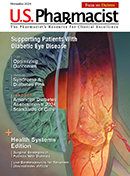Presented as an abstract entitled “The association between diabetes type, age of onset, and age at natural menopause: a retrospective cohort study using the Canadian Longitudinal Study on Aging” at the North American Menopause Society (NAMS) Annual Meeting in Atlanta on October 15, 2022, researchers share their observation that reveals how the diagnosis of diabetes impacts women’s health.
According to lead author Dr. Vrati Mehra, from the University of Toronto, and colleagues, they hope their work is valued as a means to establish a baseline to spark continued research in this area of reproductive and sexual health to ensure longer healthier living.
“Our large retrospective cohort study shows that, even after adjusting for covariates associated with age at natural menopause, we still find an association between early diagnosis of diabetes and earlier menopause and a later diabetes diagnosis with a later age at menopause as compared to those who did not have diabetes. We hope our work lays the foundation for more research in this area so we can better understand and prevent the long-term impacts of diabetes on the human body and the reproductive system,” Dr. Mehra stated.
Over the past few decades, the incidence of all variations of the diagnosis of diabetes including—but not limited to—type 1 diabetes (T1D) and type 2 diabetes (T2D) has grown worldwide and has impacted individuals of all ages. With this exponential increase, this research team highlighted that women more than any time previously have been dealing with diabetes during their childbearing years, and this has allowed a greater opportunity to look at how a premenopausal diagnosis of diabetes might influence the onset of natural menopause. This research was intended to build on earlier work that has established the risk of developing diabetes post menopause.
Baseline data that included the identification of females who reported having a premenopausal diagnosis of diabetes were extracted from the comprehensive cohort of the Canadian Longitudinal Study on Aging. Women who reported having a premenopausal diagnosis of T1D, T2D, or gestational diabetes were considered exposed. The main outcome variable was the diagnosis of natural menopause (ANM). Kaplan-Meier cumulative survivorship estimates were used to calculate the median onset of ANM by different diabetes types. Multivariable Cox regression models were used to assess the association between different types of diabetes and ANM while adjusting for various sociodemographic, lifestyle, and premenopausal clinical factors. Hazard ratios and 95% CIs were also reported.
“This research adds to the growing evidence relative to the collective toll diabetes takes on the human body. In this case, it shows that young women living with a diagnosis of diabetes are more susceptible to accelerated ovarian aging and early menopause,” stated Dr. Stephanie Faubion, medical director at NAMS.
The researchers wrote that their results “point to accelerated ovarian aging and early menopause among young women living with a diabetes diagnosis.” They concluded, “These findings should allow for more focused research geared towards understanding the long-term health implications of diabetes on women’s reproductive health and aging.”
The study was funded by the Canadian Institute of Health Research’s Canada Graduate Scholarship and Ontario Graduate Scholarship.
The content contained in this article is for informational purposes only. The content is not intended to be a substitute for professional advice. Reliance on any information provided in this article is solely at your own risk.
« Click here to return to Diabetes Update.





